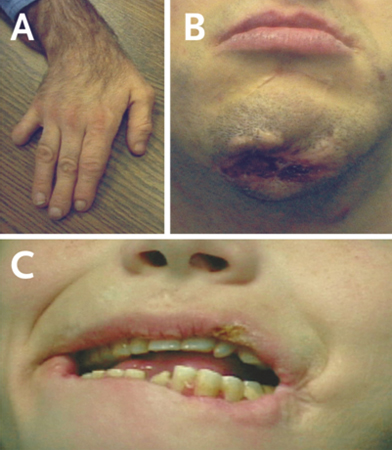History and exam
Key diagnostic factors
common
age <12 months
orange 'sand' crystals in nappy
kidney stones
pyramidal signs
testicular atrophy
male sex
Virtually all patients are male, owing to the X-linked recessive mode of inheritance. However, a few female patients have been described.[3]
developmental delay
Among the most frequent presenting symptoms in classic Lesch-Nyhan disease (LND), presenting as a failure to reach motor milestones.[26] Sometimes previously achieved motor milestones are lost.
involuntary movements
Usually among the presenting symptoms, but may develop later in the course of the disease.[3]
generalised hypotonia
A generalised hypotonia is frequently seen at presentation, usually in association with developmental delay.[26]
self-injurious behaviour, usually at age <5 years
Typically, self-injurious behaviour starts at around age 2 years. However, some reports suggest that self-injurious behaviour may start in patients as young as age 6 months and in those up to age 20 years.[25]
self-injurious behaviour focusing on the mouth and fingers
Finger and lip biting is a frequently seen form of self-injurious behaviour. Subsequent partial amputations of the fingers, lips, tongue, and oral mucosa are common. Such topographic preference is rarely seen in other diseases with self-injury. [Figure caption and citation for the preceding image starts]: Examples of self-injurious behaviour seen in patients with classic Lesch-Nyhan diseaseFrom the collection of H.A. Jinnah, MD, PhD; used with permission [Citation ends].
cognitive disturbances
Cognitive function is usually impaired, with average intelligence quotient values of approximately 70, although normal intelligence has been described in some patients. Patients do not have global intellectual disability, but rather have impairments in specific cognitive domains involving attention and mental flexibility.
uncommon
positive family history
A history of Lesch-Nyhan disease (LND) in other family members might point towards the diagnosis. Although virtually all patients with LND are men, women may be carriers.
Risk factors
strong
positive family history
The absolute risk can be calculated based on the X-linked recessive mode of inheritance. Although virtually all patients with Lesch-Nyhan disease (LND) are men, women may be carriers. Men with classic LND do not usually have children due to the condition’s debilitating effects, although reproduction is possible in men with a mild phenotype caused by partial enzyme deficiency.
Use of this content is subject to our disclaimer